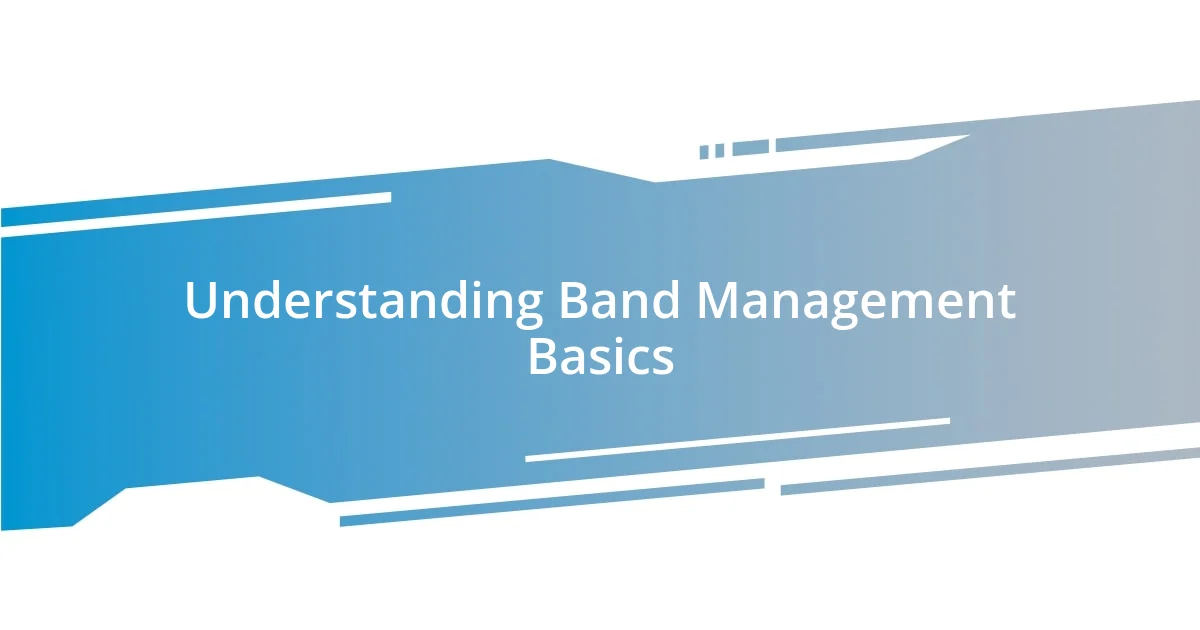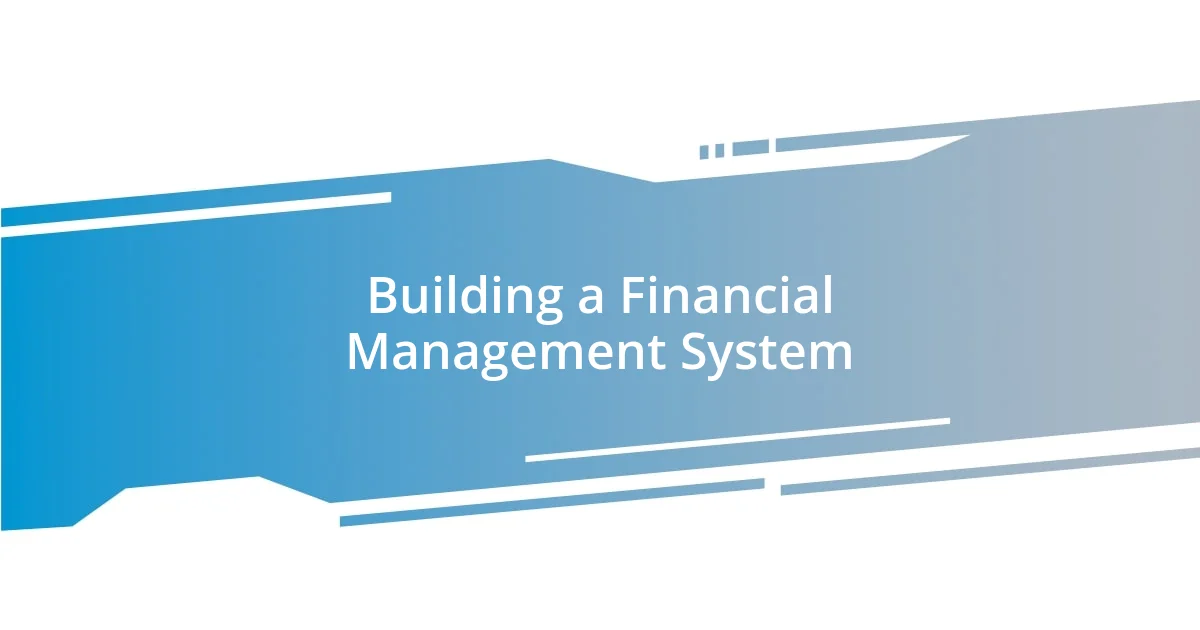Key takeaways:
- Effective band management combines artistic vision with practical aspects like communication, finances, and team dynamics.
- Clear communication channels, designated roles, and regular check-ins are crucial for preventing misunderstandings and fostering collaboration.
- Continuous evaluation of successes and challenges, along with open discussions, helps adapt strategies and enhance band performance.

Understanding Band Management Basics
Band management is truly an intricate dance, balancing artistic vision with the practicalities of running a business. I remember my early days, when I naively thought it was just about practicing and performing. But the reality hit me hard; there are contracts to negotiate, schedules to coordinate, and fans to engage. Isn’t it fascinating how one moment you’re tuning a guitar, and the next, you’re a mediator during a contract discussion?
Understanding band management basics means acknowledging the diverse roles that you, as a manager, must play: from psychologist to promoter. I often found myself encouraging band members to express their feelings about group dynamics, because quite frankly, the emotional health of a group can make or break your success. Have you ever considered how communication within your band can impact your overall performance? In my experience, open dialogue has been the cornerstone of any thriving musical collaboration.
It’s also essential to grasp the financial landscape. Creating a budget might not sound glamorous, but it’s vital. I remember one tour where I underestimated costs, leading to one too many late-night pizza orders just to keep everyone fed. This not-so-glamorous reality taught me that managing finances effectively ensures that creativity can flourish without the stress of financial strain. How do you think you could balance the fun of making music with the seriousness of managing finances?

Establishing Clear Communication Channels
Establishing clear communication channels is vital in any band setting. I’ve experienced firsthand how misunderstandings can snowball into bigger conflicts if not addressed quickly. During one rehearsal, a simple misinterpretation of a song arrangement led to tension that lingered for days. It made me realize that a designated platform for communication, whether through a group chat or regular meetings, can clear up confusion and promote a collaborative atmosphere.
To foster effective communication, consider implementing these strategies:
- Designate Roles: Assign spokespersons for different areas, like social media or logistics, ensuring everyone knows who to approach for specific issues.
- Regular Check-Ins: Schedule weekly or bi-weekly meetings to discuss progress, frustrations, or changes, creating a safe space for expression.
- Feedback Loops: Encourage constructive feedback after rehearsals or performances to address what worked and what didn’t.
- Choose the Right Tools: Utilize apps like Slack or Trello that facilitate instant communication and organization, making discussions organized and accessible.
- Create a Culture of Openness: Remind all members that their voice is valued. I’ve found that actively asking for input fosters trust and transparency among bandmates.
Each of these methods has proven beneficial for me, transforming potential tension into a collaborative spirit that enhances creativity.

Developing a Strategic Marketing Plan
When developing a strategic marketing plan for your band, it’s important to identify your target audience clearly. I’ve learned that knowing who you want to reach can shape your messaging and promotional strategies significantly. During one of our early promotional efforts, we released a single without fully understanding who our fans were. The result? A disjointed campaign that failed to resonate. I’ve realized that tailoring your approach based on audience demographics and preferences is not just ideal; it’s essential for creating effective marketing strategies.
Next, incorporating social media into your marketing plan is absolutely crucial. I remember when we made our first music video and shared it on various platforms. The response was overwhelming, with fans engaging and interacting in ways we hadn’t anticipated. It’s clear that a vibrant online presence can amplify your reach and foster a community around your music. Have you considered which social media platforms best align with your band’s identity? For me, visually-driven platforms like Instagram have brought an amazing opportunity to showcase our personality and artistry.
Lastly, I emphasize the importance of consistency in branding. We once shifted our image midway through a tour, thinking it might energize our fanbase. Instead, it confused our audience, and we lost traction. Therefore, developing a cohesive brand identity—from logos to messaging—helps fans connect and recognize your band across different channels. Staying true to your vision while allowing room for growth can create a lasting connection with your audience.
| Strategy | Description |
|---|---|
| Identify Target Audience | Understand demographics to tailor campaigns effectively. |
| Incorporate Social Media | Utilize platforms to engage fans and promote music. |
| Consistency in Branding | Maintain a cohesive image to strengthen audience recognition. |

Building a Financial Management System
Building a Financial Management System
Creating a financial management system for your band is crucial, and it starts with establishing a clear budget. Early on, I remember feeling overwhelmed by how quickly expenses can add up—gear, travel, marketing, you name it. By categorizing our costs into fixed and variable expenses, I gained a better grip on our finances, which put me at ease and allowed us to strategize better for future gigs. Have you ever wondered why some bands seem to thrive while others struggle? Financial planning might just be the key.
Next, consider setting up a dedicated account for your band’s funds. I made the mistake of mixing personal and band finances early in my career, which led to confusion and unfortunate overspending. Establishing a separate business account not only helps in tracking income and expenses but also builds credibility. Plus, it simplifies tax season—who doesn’t want that kind of relief?
Lastly, I cannot emphasize enough the importance of regular financial reviews. This might sound tedious, but I’ve found that checking in on our financial health every month helps spot trends and prepares us for the unexpected. For instance, during one review, we discovered that merchandise sales were far outpacing our expectations, which prompted us to invest more in our designs. Asking yourself how your financial choices are impacting your future is a game-changer that can steer your band toward sustained success.

Managing Band Dynamics and Relationships
Managing band dynamics and relationships is often a delicate balancing act. I’ve seen firsthand how conflict can arise when personalities clash, often over the smallest issues. I recall a time when two bandmates disagreed over our creative direction, and it quickly escalated into tensions that overshadowed our rehearsals. I learned that fostering open communication is vital. How often do you check in with your bandmates to hear their thoughts? For me, regular group discussions not only alleviated tension but also encouraged a sense of collaboration that made our music better.
Equally important is the notion of recognizing and celebrating each member’s strengths. I remember when one of my bandmates was demotivated after a particularly challenging gig. Instead of pushing forward without addressing it, I encouraged an informal session where we highlighted what each of us brought to the table. This not only lifted spirits but also reinforced our unity. It’s amazing how a little acknowledgment can go a long way, don’t you think? Building on each other’s talents can transform your collective sound and deepen bonds.
Furthermore, addressing issues promptly is non-negotiable. I’ve made the mistake of letting frustrations simmer, believing they would resolve on their own—spoiler alert: they didn’t. Instead, addressing matters in a timely manner prevents misunderstandings from snowballing. I often ask myself, “What do I need to communicate today to keep our dynamics healthy?” Embracing this proactive approach has saved us from unnecessary drama and kept our focus on making music that resonates with our audience.

Evaluating Success and Making Adjustments
Evaluating success in band management requires an honest appraisal of both our achievements and shortcomings. In one instance, we focused on our streaming numbers after releasing an EP. While initially thrilled by the downloads, I felt a nagging uncertainty about our engagement levels. I decided to dive deeper into audience feedback, and that led us to adjust our social media strategy. Have you ever found that the numbers don’t always tell the whole story? I realized that understanding the “why” behind the data is just as vital as the numbers themselves.
Making adjustments, however, isn’t just about fixing what’s broken; it’s also about recognizing what’s working well. During one of our tours, we noticed that our acoustic sets resonated more with audiences compared to our electric performances. This observation led us to incorporate more stripped-down versions of our songs into our setlist. I think it’s crucial to remain flexible and open to change—what practices are yielding results, and how can they evolve? Listening closely to both our audience and band members provided insights that genuinely enhanced our performances.
Moreover, I can’t stress enough the necessity for regular reflection as a team. After finishing a tour, we typically gather for a casual debrief over pizza. There’s something wonderfully candid about sharing highs and lows in a relaxed setting. I remember a bandmate opened up about feeling overlooked during our setlist planning. This conversation not only brought awareness to our decision-making processes but also sparked changes that made everyone feel included. How often do you take the time to evaluate your own experiences as a group? It’s moments like these that deepen our connection and strengthen our resolve to succeed together.
















